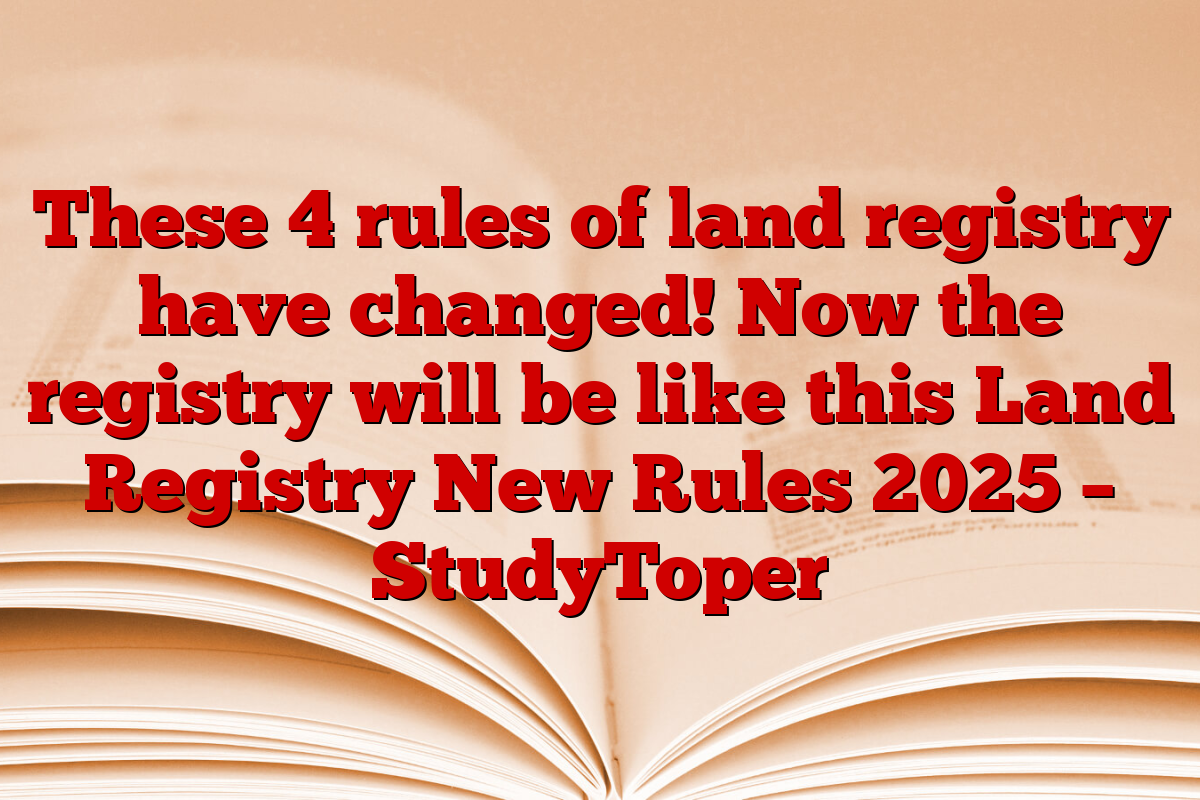The Government of India has made several important changes to make the land registry process more transparent, secure and efficient. These new rules will be applicable across the country from January 1, 2025. The objective of these rules is to make the registry process digital and easy, so that citizens do not have to face any kind of trouble.
Under the new rules, the entire registry process will go digital. Computers and internet will be used instead of paperwork. This will not only make the registration process faster and easier, but will also reduce the chances of corruption. Also, new rules like linking to Aadhaar card and video recording will increase transparency and security in the registry.
Land Registry New Rules 2025
The new Land Registry Rules 2025 aim to make the property registration process faster, secure and transparent. These rules will be applicable across India from January 1, 2025. The government aims to make the land registry completely digital so as to reduce fraud and corruption.
Main information about Land Registry New Rules 2025
| Description | Information |
| name of the scheme | land registry new rules 2025 |
| effective date | 1 January 2025 |
| beneficiary | All property buyers and sellers |
| main changes | Digital Registration, Aadhaar Linking, Video Recording, Online Fee Payment |
| Objective | Increasing transparency, preventing fraud, simplifying the process |
| execution | by central and state governments |
| Benefit | Faster process, less corruption, better record management |
Digital Registration Process
Under the new rules, the entire process of land registration will become digital. Computers and internet will be used instead of paperwork. According to this:
- All documents will be submitted in digital format
- There will be no need to go to the registrar office
- Online registration can be done from home
- Digital signature will be used
- Digital certificate will be available immediately after registration
This will not only make the registration process faster and easier, but will also reduce the chances of corruption.
Linking with Aadhaar Card (Aadhaar Card Linking)
According to the new rule, linking with Aadhaar card will be made mandatory at the time of property registration. In this process:
- A person buying or selling property must link his Aadhaar card
- Biometric verification will be done
- This will eliminate the possibility of fake registration
Linking to Aadhaar card will increase transparency and security in the registration process.
Mandatory Video Recording
Under the third change, video recording of the registry process has been made mandatory. Under this:
- Complete video recording of the registration process will be done
- Statements of buyer and seller will also be recorded
- Video recording will be kept safe on government servers
- This will become an important evidence in case of any dispute in future.
This will bring transparency in the registry process and reduce disputes.
Online Fee Payment
Now the payment of registry fee and stamp duty will be done completely online. According to this:
- Payment can be made through credit card, debit card, net banking and UPI.
- Confirmation will be received immediately after payment
- Cash transactions will stop completely
This will make the registration process even faster and the use of black money will be controlled.
Land Registry 2025: What is going to change? (Land Registry 2025: What’s Changing?)
The new rules to be implemented from 2025 will bring many important changes in the process of property registration. These changes will save time, make the registry transparent and secure, and simplify the process for citizens.
- Digital process will reduce registry time to few hours
- Aadhaar linking, video recording and online payments will increase transparency in the registry
- Fake registration and benami property will be banned
- Online payments will help prevent bribery and use of black money
Unique Land Parcel Identification Number (ULPIN)
ULPIN or “Geo-Aadhaar” provides a 14-digit alphanumeric code for each plot, based on its geo-coordinates. it:
- Helps streamline real estate transactions
- Helpful in resolving property disputes
- Improves disaster management efforts
Has been implemented in 29 States/Union Territories.
National Generic Document Registration System (NGDRS)
NGDRS or e-Registration provides a uniform process for deed/document registration across the country. it:
- Allows online entry, payment, appointment and document search
- 18 States/Union Territories have adopted it
- Share data with 12 other national portals
e-Court Integration
The purpose of linking land records with e-Courts is to provide authentic land information to the judiciary. it:
- Will help in faster disposal of cases
- will reduce land disputes
- Integration has been approved in 26 states/UTs
Transliteration of Land Records
To overcome language barriers in access to land records, the program is transcribing land documents into any of the 22 languages listed in Schedule VIII of the Indian Constitution. it:
- Already in use in 17 states/UTs
- Will make access to land records easier
- Will provide information in regional languages
Bhoomi Samman (Bhoomi Samman)
Under this initiative, 168 districts in 16 states have achieved “Platinum Grading” for completing more than 99% of the core components of the programme. These include:
- computerization of land records
- digitization of maps
- simplification of processes
Disclaimer:
This article is for informational purposes only. The new rules of land registry may change from time to time. Please contact your local registrar office or government website for accurate and updated information. Please verify with official sources before relying on the information provided in this article. The author or publisher is not responsible for any errors or omissions.
